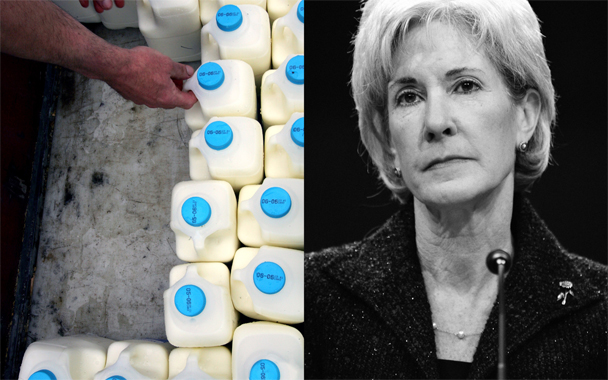When she takes up her post as head of the Department of Health and Human Services, which oversees the FDA, whose interests will Kansas Governor Kathleen Sebelius represent: the American people’s or multinational corporations’?
Over the next few days, we’ll get a clear answer to that question.
Earlier this month, the Kansas legislature passed a law requiring that any milk product labeled as coming from cows not treated with the artificial growth hormone rBST also carry the following disclaimer in “exactly the same font, style, case, size and color”:
The FDA has determined that no significant difference has been shown between milk derived from rBST-supplemented and non-rBST-supplemented cows.
That labeling regulation, which was slipped as a rider into another (much longer) agriculture bill, has been on Sebelius’s desk since April 9. She has until this Thursday to veto the bill, or it will automatically become law.
If she fails to veto it, the giant drug company Eli Lilly and Co., which bought Monsanto’s Posilac (the trade name of rBST) last summer, will no doubt be pleased.
But the governor will incur the wrath of 29 groups representing farmers, consumers, and organic food purveyors who sent her a letter earlier this month asking that she kill the legislation. Signatories to the letter include AllergyKids, Breast Cancer Action, Center for Environmental Health, Center for Food Safety, Family Farm Defenders, and The Humane Society of the United States.
They point out the wording required by the law is based on an 18-year-old FDA review, and that subsequent scientific studies—and even some of the FDA’s own publications—have shown the statement to be dead wrong. There are significant differences, according to the groups, and some of them may affect human health.
“Since the FDA’s controversial decision to approve the use of rBST, questions have only grown about its safety for humans,” Michael Hansen, Senior Scientist for Food Safety at Consumers Union, said in a press release.
If Sebelius doesn't veto the bill, Kansas will be bucking a national trend. Bowing to consumer demand, grocery retailers such as Wal-Mart, Kroger, Publix, and Safeway now source their store-brand dairy products only from cows not injected with rBST. And according to the Center for Food Safety, more than half of the nation’s largest dairies have gone partially or completely rBST-free.
It’s high time the FDA did, too.



 Pinterest
Pinterest


